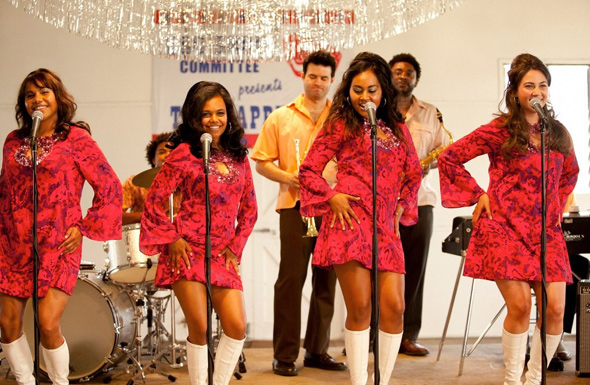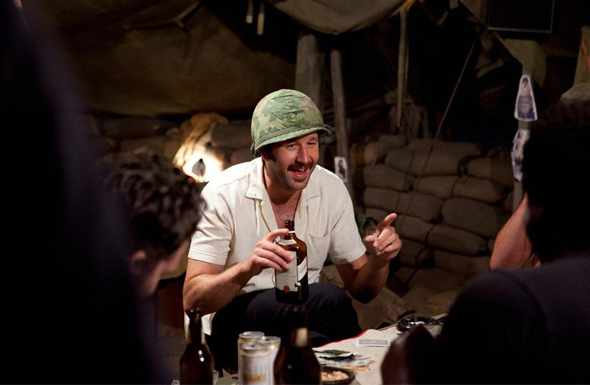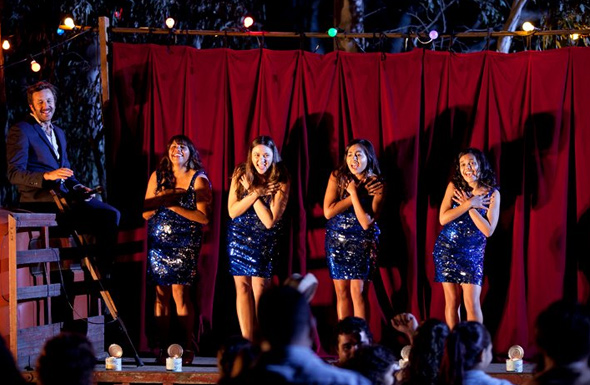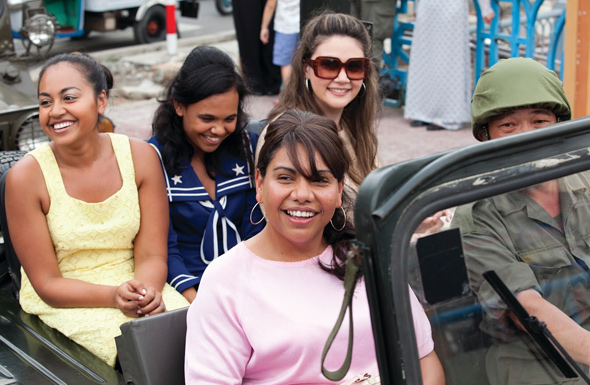Interview: Wayne Blair, Director of ‘The Sapphires’
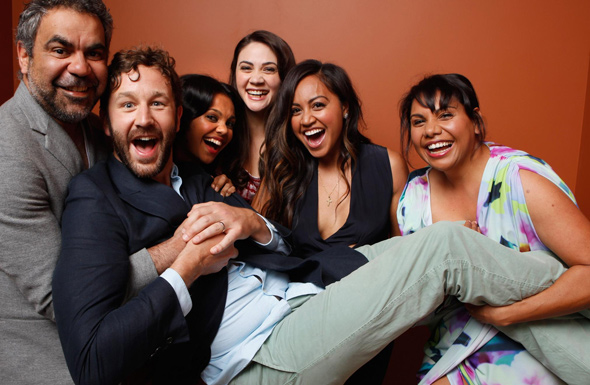
A hit at this year’s NZ International Film Festival, Aussie flick The Sapphires opens in cinemas this week. Based on a true story and set to a soul music soundtrack, The Sapphires tells the tale of four Aboriginal women in the 60s who are discovered by a talent scout (Chris O’Dowd, Bridesmaids) and form a musical group that travels to Vietnam to perform for troops. Director Wayne Blair was in town recently and he sat down for a chat about the film with Flicks’ Dominic Corry.
FLICKS: Congratulations on the film – the response has been great at festivals. How does it feel now that it’s rolling out to a general audience? Can The Sapphires keep that momentum going?
BLAIR: Look, that’s the million dollar question. Yeah, I think so. It is an audience film and being in different places like Telluride, Colorado, that was such a different sort of film audience, then we had 2,000 French people. And then the last week was in Toronto we had two screenings I was involved with. It played beautifully in a sense of just people getting into it and at the end, you know, having a little bit of a laugh and a tear. So, look, it’s doing well in Australia at the moment, it’s nearly made $13 million in six weeks.
Wow. It’s been out there about a month, right?
Six or seven weeks, I think it’s the seventh week now. Yeah. So, you know, people are getting along to see it. And I think it’s one of those films that people are seeing again, and taking someone else or taking their loved one or someone they feel special with, you know, they want to take them.
What’s the biggest challenge in transferring that kind of film festival reaction into a wide release of a film?
I think the challenge is having a hook I suppose, firstly from a marketing side of things. Now this film doesn’t have Tom Cruise and it doesn’t have Angelina or Brad Pitt, it’s got these four Aboriginal girls. It’s got Chris O’Dowd of Bridesmaids fame but he’s not Tom Cruise, not yet anyway. So you have to get people off the street in a suburb or a provincial place in New Zealand, or Australia or bloody Holland to go see it. I suppose having that feel-good element to it, especially the soul music, there’s a point of sale there with just these songs and through having Jessica Mauboy plays Julia as the lead.
How’s it looking for an American cinematic release at the moment?
Well, the Weinstein Company had bought it, so they’ve had it the last six months.
And it’s definitely coming out in cinemas?
Yeah. Definitely. That’s in the contract.
Great. You’re not worried about “Harvey Scissorhands” [N.B. Harvey Weinstein is notorious for re-editing films he acquires for distribution] ?
Well, you know, it’s been funny. Our time with him, my time with him [Harvey Weinstein] has been very good. I’ve heard a number of stories but I suppose Harvey might have heard a number of stories about me [laughs]. And I’ve changed. But, I suppose, it’s not the sense of change, it’s the sense of detailing every story – story by story. He’s been really, really good with us. We haven’t cut the film up, we had a couple of minor edits to the film and just gave a few facts to the American market. And at the end of the film, just stating the facts for people that don’t get the aboriginal politics.
Did you feel pressure with this film to educate an international audience about the Aboriginal experience?
Well, yeah. It’s a hard one because you want to tell a good story, a good yarn. So, just having four girls of colour up on the screen, having the same wants and needs as non-indigenous girls is sort of politics in itself. Having these four black women live and breathe and travel, you know. But, there are also some undercurrent themes and politics sort of rears its ugly head as politics does in anyone’s life.
Was the idea with Chris O’Dowd’s casting to give the film some international appeal? As you’ve said, he’s not Tom Cruise but he does have some box office appeal.
Yes, very much. You know, the film budget was around $9 million. So with that comes a responsibility to someone saying, “Does the guy do the numbers?” you know? But I think at that time we were due to start shooting in like three or four weeks. So, I don’t know, you could have played him, you know? It just came along at the right time and Chris did everything. So yes, to answer your question, yes. But, we wanted the right guy for the role in the same breath and we got both.
It’s great timing for his ascension as a movie star. He’s not overexposed, but he’s the perfect guy to just be in this kind of film you can discover.
Yeah, I know. At that time he had played basically all supporting roles, and now he finds himself the lead. I remember him being in Cannes and we’re just about to be driving that car that takes you 75 minutes to the red carpet premiere. And he just said “Wayne, you know, I never thought in my wildest dreams I’d be here, be in Cannes”. The first time he was in Cannes was with small little Australian film from Victoria.
The four girls have got a nice rapport on screen. How did you ensure that?
We had four to six weeks of rehearsal with the girls. And because of the casting process they were in the same bloody room for like six months, once every three or four weeks, so they sort of got to know each other. But during the rehearsal process because of the choreography, I felt like if you get people to dance together every day for this three to four weeks, they get to know each other, sweat with each other, smell each other. And because they auditioned together with other girls, they knew the scenes quite well like 13 of 15 of the major scenes. Usually on a film I suppose when you’re casting two or three people, they’ll know two scenes or three scenes quite well. And when they shoot those scenes, whether it be in TV or short film, those scenes usually really hit the mark. Well we had about 15.
Were you trying to target a female audience with the story?
Look, you know, it’s interesting. You know, you have those film school or whatever, short courses: “What’s your market, and what’s this, and what’s your budget?” That’s what Hollywood does. That’s why they hire stars straight away. Then you see those American rom-coms that have Vince Vaughn or Jennifer Aniston. They don’t quite hit the mark but someone gets to go “Shit, I made money”. So, in a sense with this film it was totally the opposite. It was like, let’s just tell the story. We knew there was a market for women ’cause of the music, and for men as well. And then you’ve got this Chris O’Dowd type character, just a normal dude who likes to drink and likes to look at chicks you know? Which is a lot of us, sort of the male population of the world, and it’s just played into our favour. But Chris and Deb being the two leads is sort of, not your typical two leads. Well they’re not Vincent Vaughn or Jennifer Aniston you know, but they’re sort of better – because they’re real, and you fall in love with them and you want to be them, you know? So, I don’t know, something, something just happened.
America comes across as this kind of exotic promised land in The Sapphires. How central was that to telling the story?
America is a touchstone for the civil rights movement, definitely for Aboriginal people. The civil rights movements was, of course, started way earlier than that, but it mirrored the American rights movement. So it was a bit of a catalyst because you had these people of colour in another country marching for basic human equality. And that’s what aboriginal people were getting at that moment. It was something not to look up to, but just to compare where these different worlds were and just to say, “Okay, if these people are doing that, we can do this”. So, not a sense of a fairy tale but something to learn from.
Did you ever find yourself, when you had to make a creative call about something, factoring in the international audience? Or were you committed to an Australian point of view?
I was committed to a human point of view. You know now I think about it, you look at the Martin Luther King stuff, and Robert Kennedy just resonates to, let’s say an American audience, then there’s UK and everyone else in the world. You know, the start – I think that’s what, that came from Tony Briggs, he wanted us to go out to the world, whereas I wanted my mum to like it first, my community to like it second, and then the rest of Australia, and then the world. So, look, I suppose in casting Chris O’Dowd, I suppose having black soul music. That sort of says a big “Yes”.
And then you have Vietnam, everyone knows that because it’s probably the most famous war in history, bigger than World War I, World War II because it’s sort of our war now. But, unknowingly for me, it was a bit of ignorance is bliss, ’cause I just wanted to get the story and just complete the days and make sure that journey arc of each character was clear. Because having four girls as well, sometimes when you see films there are only two or three leads, and you only have time to follow two or three people. So, you know, it was a hard one trying to follow five, but the script writers, Tony and Keith sort of made it easier. But it was still trying to be clear and truthful and accurate with each individual character’s journey.
The Sapphires is based on a true story. Were you concerned about being as faithful as possible to what happened?
It was a balance, because the fact is only two ladies went to Vietnam, not four. But, you know, from whatever happened, you know from when they started being Sapphires is very true. So Tony got a lot of the true stories from the ladies themselves and that’s in the film. They didn’t sing the extent of the songs we have in the film, but they went on that journey that these girls did. It’s based on the strength of these women and the strength of their stories. And then Tony and Keith have just elaborated a little bit out at this.
There used to be films that organically became sleeper hits, but these days many get sold on the basis they are going to be a sleeper hit. It’s kind of The Full Monty effect. Does that bring a unique set of pressure in a film that starts up as kinda small-ish, but which has been predestined to have breakout success?
Yes. Yes it does, I have to admit. But, you know, I just treat it audience by audience. And when you see the audience that were outside tonight, you know, seeing an audience smile, laugh and have fun that takes the pressure off. But, you know, what I do know now is that the film has nearly made $13 million in Australia. People have been paid their money back and it’s sold to a 110 territories and countries in the world.
The Sapphires opens in cinemas on October 4th. MORE INFO / SESSION TIMES


